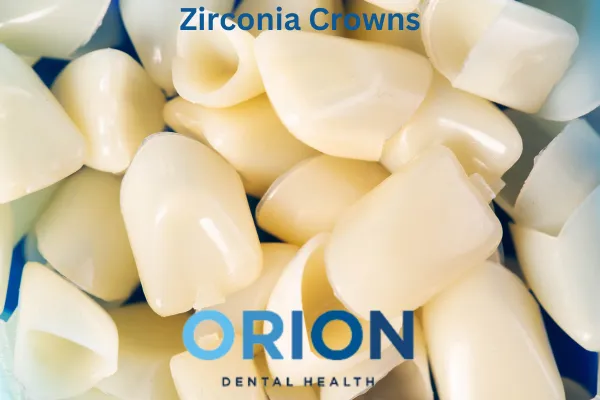Will the real tooth under it be damaged when removing the Zirconium Crown?
The removal of a Zirconium Crown should not cause damage to the underlying natural tooth if performed by a dental professional using appropriate technique. The crown is carefully detached using dental instruments, and any cement or bonding material is gently dislodged. However, there can be rare cases where minimal or temporary damage may occur. It is always recommended to have a skilled dentist or prosthodontist handle the removal process to minimize any potential risks and ensure the preservation of the underlying tooth structure.

Does gum recession occur with a Zirconium Crown?
Any dental crown, even Zirconium Crowns, may cause gum recession. The danger of gum recession may be reduced, however, with correct crown installation and care. To preserve a healthy connection with the surrounding gum tissue, it's crucial to make sure the crown is correctly fitted, with enough room and contouring. In addition, maintaining excellent oral hygiene habits, such as consistent brushing, flossing, and professional cleanings, may aid in preventing gum disease and lessen the possibility of gum recession around the crown.
Does the Zirconium Crown have any damage to the applied tooth?
An well placed and maintained Zirconium Crown shouldn't harm the tooth's natural structure. The tooth the crown covers is meant to strengthen and be protected. To make room for the crown, a tiny piece of tooth structure may sometimes need to be removed during the preparation procedure. This is a routine operation that has little effect on the tooth's general health. To guarantee correct fit and reduce the possibility of any possible harm to the underlying tooth, it is crucial to have the crown installed by a qualified dentist.
Do teeth with Zirconium Crowns rot from the inside?
Teeth do not internally decay as a result of Zirconium Crowns. The underlying tooth is still prone to decay if good dental hygiene is not maintained, despite the fact that a crown is in place. If not properly cleaned, the margin—the region where the crown meets the tooth—can become a breeding ground for germs and eventually rot. To stop deterioration and preserve the health of both the crown and the underlying tooth, regular brushing, flossing, and dental checkups are essential.
Does Zirconium Crown cause odour?
Zirconium Crown does not smell. However, oral hygiene is not taken care of, oral and dental care is neglected, and if gum diseases occur, bad breath occurs. The Zirconium Crown, which an experienced dentist duly makes with quality material, does not cause odour.
What are the properties of zirconium?
The metal element known as zirconium is designated by the letter "Zr." It is a heat- and corrosion-resistant, greyish-white substance with strong rust and calcification resistance. It is a chemical used in nuclear power, jewellery production, steel production, heat-resistant military equipment, the perfume business, surgical materials, and dental materials.
Zirconium is a material that dentists choose to use when treating patients who want a beautiful smile. Zirconium-filled teeth are entirely natural-looking and do not add to existing dental problems. Zirconium is utilised in dental veneer procedures as ceramic, and because of its colour resemblance to ivory, it is difficult to tell apart from natural teeth. Zirconium-based teeth are light-permeable, preventing vitamin D insufficiency and providing teeth a more natural look.
Is there a colour option for zirconium dental veneers?
There are many colour options in Zirconium Dental Crowns, and you can apply the colour you want to your teeth.
What does cad/cam mean? What does it do?
Computer-aided design (CAD/CAM) is a programme. Through webcams attached to the computer, this programme measures the patient's mouth. One thousandth of an inch is the error margin. The devices automatically abrade the zirconium plates without contacting them, in accordance with the measures established. These plates are five times more compatible with implants or teeth than those made by hand.
Does tooth crown material change according to age groups?
Zirconium, porcelain, and metal are the main materials used to make veneers. The materials used to build crowns are the same for all age groups since aesthetic appeal is vital to both youngsters and adults.
With Zirconia Crowns, a research firm assessing young people' and children's parental satisfaction obtained more pleasing findings.
What is the difference between a metal-backed veneer and a Zirconium Crown?
- Zirconium's white colour, endurance, and robustness provide an attractive look.
- Metal allergy may be detected in crowns with metal supports, but not in Zirconium Crowns.
- Zirconium Crowns do not exhibit heat or cold sensitivity because of the material's very low conductivity.
- Zirconium Crowns are far less likely to have issues like yellowing, staining, and plaque development than metal-supported crowns do.
- In the case of a metal-supported crown, the gingival region will reflect a grey colour, but not in the case of a Zirconium Crown.
- The Zirconium Crown seems natural and white, in contrast to the metal-supported crown's matte and manufactured look.
Grey colour occurs on my gums at the edge of my old veneers. Will I have the same problem with Zirconium Crowns?
The gingival margins of the Zirconium Crown, which lacks a metal substructure, do not exhibit back colours. Crowns made of metal reflect light, giving them their grey colour.
Can gum be chewed after the Zirconium Crown procedure?
It's advised against chewing gum following the surgery. Because eating gum and other sticky things may cause crowns to fall off. This scenario has a number of negative effects, including the development of foul breath and the loss of crowns.
